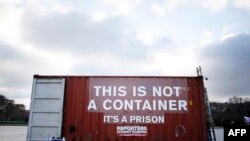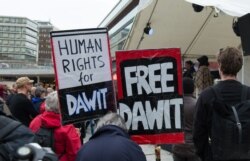In 2002, newspaper editor Aaron Berhane fled his home country of Eritrea for security reasons, after his paper criticized the government and called for democratic reforms. He was one of the lucky journalists. More than two dozen others were arrested during a coordinated crackdown that led to the closure of seven newspapers and the end of independent journalism in the country.
After a daring escape and eight years of separation from his family, Berhane now teaches journalism at a college in Canada. But he laments the situation in Eritrea, which he says continues to stifle speech and the press, and is one of the most repressive places in the world.
"Even an average person has difficulty expressing thoughts, assembling to discuss and having free thoughts," he told VOA, speaking in Tigrinya. "The system controls even this."
A new report by the Committee to Protect Journalists (CPJ) echoes Berhane's assessment. The group ranked Eritrea as the "most censored" country in the world, more than North Korea, Turkmenistan and Saudi Arabia.
The group found that Eritrea is the worst jailer of journalists in sub-Saharan Africa, and reports up to seven journalists may have died in custody. The state holds a legal monopoly over broadcast media, and only about 1 percent of the population have access to the internet.
"Eritrea is really close to an information black hole," Courtney Radsch, the advocacy director at CPJ, told VOA. "There is virtually no independent journalism there. The government uses a combination of repressive tactics, physical and digital repression, and censorship to restrict basically any sort of independent information from getting in or out of the country. It restricts the movement of any journalist. And the only real ability to cover the country is by exiled media."
Over the years, the Eritrean government has downplayed the extent of control it exerts, or argued that its policies are necessary to protect the interests of the nation.
Berhane said that, although the censorship report may be shocking to outsiders, it is not surprising to Eritreans. "Eritrea is still number one based on the pressures on average people. People don't have freedom of movement, don't have the right to express ideas. Basic rights of individuals are being violated," he said.
Missing since 2001
In a separate report, Amnesty International commemorated the 18th anniversary of the day 28 Eritrean "prisoners of conscience" were arrested and never seen again. The group included 17 journalists and 11 politicians who criticized Eritrea's longtime ruler, Isaias Afwerki.
None have been heard from or seen since their arrest in 2001. In 2010, a prison guard confirmed the deaths of some of the journalists. The government has repeatedly rebuffed VOA requests over the years to discuss the prisoners.
"It is a travesty that this appalling injustice persists almost two decades on, more so now that Eritrea is a member of the U.N. Human Rights Council," said Seif Magango, Amnesty International's deputy director for East Africa, the Horn and the Great Lakes.
Human Rights Watch joined Amnesty this week in calling for the release of the prisoners.
Berhane, who has closely followed the plight of his colleagues behind bars in the country, said the censorship and imprisonment are about one thing: control.
"The government looks at journalists from within or outside through suspicious eyes and regards them as spies," he said. "When you have a system that has such a mentality, it's unthinkable that journalists can legally and freely work. So, one way or another, if the government is paranoid, it is afraid of everything. And because they don't have the resources to control everything, they have to shut everything down."





